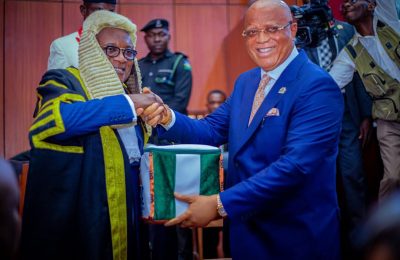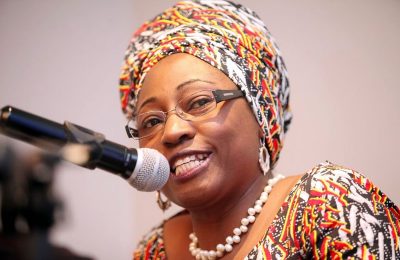Speaker of the Oyo State House of Assembly, Honourable Adebo Ogundoyin was recently elected Chairman, Conference of Speakers of State Legislatures in Nigeria. He speaks with WALE AKINSELURE on how he emerged, challenges of state Houses of Assembly, why local government autonomy bill failed to sail through in last constitution amendment exercise, financial autonomy of state legislatures and its relationship with the executive.
The chairmanship contest was initially a two-horse race between you and the Speaker of Ogun Assembly, as the post was said to have been zoned to the South-West. How did it become just you left in the race hours before the election?

I have heard about the zoning pattern in different places; that the position of chairman was zoned to the South-West. Contrary to that, the positions are zone either to the South or to the North. The last chairman from the South was from the South-West; so if there will be any other kind of zoning, it would have been taken away from the South-West. So, it was just a blanket zoning to the South. I took it upon myself to contest for the chairmanship because I have a lot of confidence in my ability to deliver on what I believe are the needs of the Speakers, each state House of Assembly. I had a clear idea of what I was trying to achieve, what was required by the state houses of Assembly. After thorough consultations, I was convinced that if given the opportunity, with the support of the executive of the conference of speakers, we will be able to make a remarkable impact in state legislatures in the nation.
You said in your tour, you discovered challenges of state Houses of Assembly. What were those challenges vis-a-vis your agenda as chairman of the Conference of Speakers?
I will like to look at it in three parts. The first part is the struggle has been ongoing for some time which is financial autonomy for state legislatures. It is important that state legislatures nationwide enjoy some sort of autonomy in order for them to make unbiased judgment. It is also important for them to have independence in achieving what they wish to achieve. We cannot underestimate the impact of financial autonomy for state legislatures. Most certainly, that is the major challenge that each of the state houses of Assembly have. The solution is not trying to cajole a governor or Speakers, it is a constitutional matter as we speak. The constitution has been amended to include financial autonomy for state legislatures. It is now a matter of implementation of the financial autonomy by each state government in order to strengthen the legislative institution. It is important this is resolved as soon as possible. The arm of government that has suffered the most is the legislative arm and is constantly being oppressed. The sooner we free the legislative arm of government, the better representation the people will have. When the people have proper representation, it will make the executive arm of government more accountable for their actions, more accountable for what they are trying to achieve. This will improve governance in Nigeria. One very important aspect of my agenda as Chairman of the conference of speakers of state legislatures of Nigeria is to ensure the proper implementation of financial autonomy for state legislatures.

There is the issue of having the buy-in of the state legislatures to implement your agenda. In your tour, what do you make of the disposition of the Speakers of the state houses of Assembly concerning having financial autonomy?
Whatever we do today is not mainly for our own personal benefits because in politics, no position is permanent. The best you can do is to do our best to strengthen any institution we find ourselves so that there will be proper dividends of democracy to the people. If a speaker says he doesn’t want financial autonomy, he doesn’t want freedom; you must understand there must be a reason behind that. A lot of times, the speakership position is very volatile, very unstable. I would say it is probably the most unstable position in government.
Unstable! How do you mean?
Unstable in terms of the fact that you can wake up one morning as Speaker and go to bed as a floor member, and it can happen at any time. We have seen times without number when Speakers try to hold a position especially if it is not on the same page with the governor, what happens immediately, with no repercussion, is the removal of the Speaker. So, if a Speaker tells you he’ll rather be in bondage than to be free, then you must understand that there must be an underlying factor because nobody will chose slavery over freedom. There is no Speaker, legislative house that do not want freedom in terms of autonomy for state houses of Assembly.
During the recent constitution amendment process, many people were baffled that local government autonomy did not get the required support of State Houses of Assembly. You were among those who expressed support for the autonomy when local government workers came protesting. Were you so compelled by governors not to allow local government autonomy sail through?
To put everything into proper context, I, personally, have reservations about local government autonomy. I am skeptical about the real objective because of my fundamental political belief which is true federalism for a federal government like Nigeria. I honestly believe that each state should captain its destiny and lead its people to the Promised Land which will be determined by the people of the state. We have to appreciate the diversity in Nigeria, we have to appreciate that Nigeria is a country with different tribes, religion, people who want to determine their future on their own. A lot of people talk about autonomy for local government without really understanding the consequence of the proposed autonomy. There will be challenges in terms of local government financial autonomy although in Oyo State we approved the amendment of the local government financial autonomy. It was approved by the Oyo State House of Assembly and my views are personal not those of the Assembly. Local government administration was not assented to by the Oyo State House of Assembly whereas the local government financial autonomy was approved by the House. We believe federal government should not have any direct control over the happenings in the local government. We strongly know there is no corner, square inch of the local government that does not belong within a state and there is no square inch of a state that does not belong within a local government. Trying to cause a division between the state and local government will not help us but only cause more harm than good. It is my personal belief that whatever accrues to a state government should be given to the state government to determine its own destiny. You have this in America, United Kingdom, Australia and many other developed countries whereby the federal government is an entity and the state government is the other entity. But, when you start to introduce different tiers of government, performing almost the same role in different capacities, it can be cumbersome, expand government and make cost of governance higher among other disadvantages. There are advantages and disadvantages to local government autonomy. Ibadan North local government, for example, probably has the highest number of pupils along with Ibadan South West, they will require a lot of teachers, primary health centers, personnel. Who determines how one local government gets over the other? Who determines how much Ibarapa East gets versus how much Saki West gets. The federal government determines this. Isn’t the federal government already too big? If we have internal disputes, that means we have to go to Abuja to resolve this dispute rather than resolve our matters locally. What I see is that local government autonomy will give the federal government more power over state and local activities which will slow down development because of bureaucracy.
What is your definition of true federalism amid the yearning of Nigerians for a better run Nigerian system?
We are slowly but surely moving to the idea of true federalism. The rail system has been moved to the Concurrent List. Power generation cum distribution has also been moved to the Concurrent List. The item on airports is being looked into. We want each state to be free to determine their future. In United States, there are some states where there are higher taxes for producers, there are states that have lower taxes for producers. A private investor can determine how to station his company depending on how policies in each state will favour him, create competition within states. We need a system where there will be competition, because competition breeds excellence. If there is competition between Oyo and Ogun States in terms of who has capacity to produce power for manufacturing companies, you will see that states will invest more in power generation to the benefit of the people. You cannot underestimate the power of competition between states in order for Nigeria to move forward as a nation.
While the Assembly under your leadership may talk about number of bills passed, resolutions made, some worry about the debt burden of the state as a result of how speedily the Assembly approves of loan requests from the executive. Are you so compelled to approve of loan requests as they come?
The debt burden should not be a concern. If you look at the debt profile of the state as of today compared to what it was as at when we were incurring those debts, you will see that it is still in a very safe place. The Oyo State House of Assembly is very intentional, responsible before debts are acquired by the state government. Most of the debts that were incurred in the last Assembly had an expiration period of the end of the tenure which is May 29, 2023. Most of those loans were not carried over to this new dispensation. And we’ll ensure that the loans incurred during the current dispensation are paid back before the expiration of this tenure so it doesn’t affect governance of the next term. We have been very intentional and particular about that. The House of Assembly also has a strong oversight system to ensure money is judiciously spent and that loan facility is paid back. The House of Assembly will be coming up with the report soon and through the House Committee on Finance and Appropriation and Public Accounts are working hand in hand to release report for the loans incurred and paid back. If you look at the reasons for the loans, it is for capital expenditure and infrastructural development across the State.
The constant notion is that State Legislatures are tied to the apron strings of the executive, particularly the governors, how do you feel of this notion?
Everybody has their opinion but I would say the legislature is not supposed to work isolated from the executive. In the same vein, the judiciary is not supposed to work in isolation of the executive and legislature. Government is one divided into three arms. Government is not just the executive; government is also the legislature and the judiciary. Let’s see government as the umbrella company with one goal. The primary objective of the company is to secure the lives and property of the people. So, when people say how do we feel that we are tied to the executive, it is the same way I will ask how does the executive feel that it is tied to the apron strings of the Legislature, because without the legislature, they can’t do anything. They need our approval for various things. So, we are all tied to each other’s apron strings. We see ourselves as one performing various functions for the purpose of checks and balances.
Nigerians are going through a lot of hardship due to the current harsh economic situation. As the chairman of the Conference of Speakers, you are close to the corridors of power. What must the President Bola Tinubu administration do to reverse hardship?
It is important that the government identifies leakages and blocks them. We need to stop wasting resources on unnecessary things; we need to cut the cost of governance. It is the resources of this country that is being mishandled, misappropriated, stolen; we must identify human capital resources too. Human capital resources are being lost daily, for example the Japa syndrome, and everybody is still thinking about money. There has to be a system where we are able to block the leakages. If in the first four years of the reign of President Bola Tinubu, he is able to block these leakages, increase the capacity of the country, the second phase will be deploying resources in the right sectors to accelerate growth and development.
READ ALSO FROM NIGERIAN TRIBUNE







